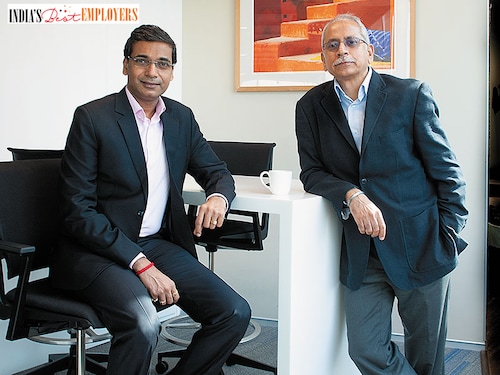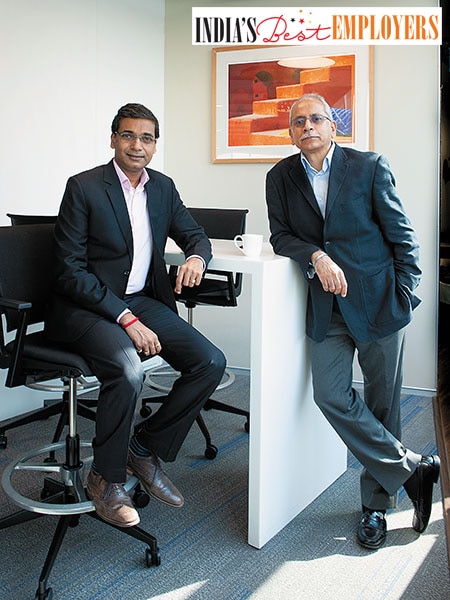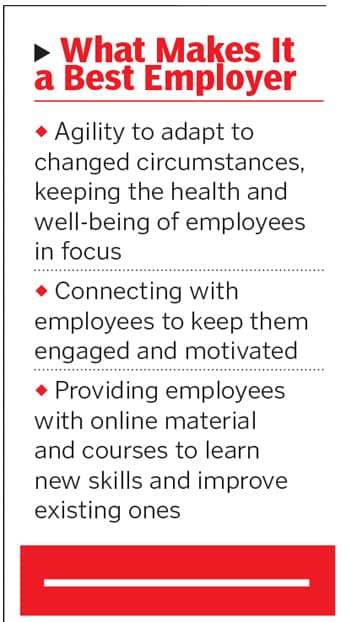India's Best Employers: Tata Sky, charting a new course
Remote working was not alien to Tata Sky, but it made employees' lives easier during the pandemic with virtual learning modules, fitness sessions and motivational talks


 Sangram Chavan (left), CHRO Tata Sky, and Harit Nagpal, MD & CEO
Sangram Chavan (left), CHRO Tata Sky, and Harit Nagpal, MD & CEO
Image: Neha Mithbawkar for Forbes India[br]Although remote working was not new to Tata Sky, “the entire organisation operating virtually for such an extended period, with increased efficiency and effectiveness was certainly unimaginable”, says Sangram Chavan, CHRO, Tata Sky. “Our policies like open seating, flexible work timings, work-from-home and positive attendance helped us make this transition relatively easy.” The fact that the company has been investing in high-end technology for years helped support this transition, with collaboration, remote working infrastructure, aand cloud-based HRMS systems keeping the bond with employees alive.
“It has reinforced our belief in having an agile organisation,” says Harit Nagpal, CEO, Tata Sky. “We can’t predict in what form or where the next crisis will come from. However, we can be nimble enough to handle whatever comes.” It is no surprise then that Tata Sky scores 82 percent on the ‘Agility Index’ in Kincentric’s survey of its employees, compared to the industry average of 66 percent.
The company’s agility in adapting to change is just one of the factors that have placed it among India’s Best Employers, according to the survey by Kincentric. “A company that keeps its promises to its employees will be considered to be a good employer,” says Nitin Sethi, CEO, Human Capital Solutions, India and South Asia, Aon Consulting. “So these revolve around what kind of peer group you would have, how you would grow as an organisation, and create your whole culture around it regarding management, leaders.”
As the country’s entire workforce, barring essential services, adapted to working from home, Tata Sky realised that most of its employees did not have workstations at home. “There were many who worked with data and multiple screens,” says Nagpal. “We shipped an office table and an ergonomic chair to all homes, and a large screen to select employees. Broadband connections were also provided to each employee.”
And it was not just working from home that the company enabled. Contact details of counsellors were shared, along with organised sessions with nutritionists, virtual Zumba classes and motivational talks from health experts. But it were the e-learning courses that seem to have been a hit among employees.The HR team designed an email campaign that focussed on behavioural, functional and emerging skillset needs, according to Kincentric. The campaign created awareness about the different platforms—Skillsoft, Internal University, Edcast—that were available to employees. Skillsoft learning resources saw more than 90 percent of employees accessing different resources like courses, ebooks, audio books, videos and job aids, depending on their learning preferences. Employees spent close to 800,000 minutes on Skillsoft since the lockdown.
Employees also benefited from various offerings of Tata Management Training Center (TMTC), including Learning Latitudes, LeaderCraft podcasts, and Coursera. More than 600 employees enrolled for 2,700 courses on various topics, ranging from health and wellness, professional development, and data analytics. Mind-shift and time management were the most studied topics.
Employees were also kept engaged through various other initiatives. “We launched a periodic pulse survey to understand the mood of employees around remote working, collaboration, team interactions, learning, well-being and work-life balance,” says Chavan. “Virtual engagement initiatives like Quizathon, Little Painters contest, employee connect sessions were launched during the lockdown for employees to participate with their families, and share moments of togetherness.”
He adds that the company’s #IAmFit health and wellness programme was reworked to get employees their health trackers and subscriptions at home weekly fitness sessions were moved online, with their frequency being doubled, and special sessions being conducted with themes around building immunity, emotional well-being, and effectively managing work-life balance. In Kincentric’s survey, Tata Sky scored higher (79 percent) than the industry average (77 percent) on the ‘Employee Engagement Index’.
“Tata Sky is a company with significant resilience… they are in an industry where technology is changing on a regular basis,” says Sethi. “Their passion is to not strive for perfection but to keep getting better every day that’s the promise they make to their employees pretty strongly, and are in sync with the people programmes and practices.”
Over the years, the profile of Tata Sky has evolved, as has the profile of its employees. “We’ve moved from being just a DTH provider to a profitable and customer-centric source of content delivery. The skills we seek in employees match the new profile of the business,” says Nagpal.
Chavan adds that hiring fresh young talent is one of the key requirements that led to the company’s management trainee programme: “We hire management trainees from top business schools of the country, and they undergo a cross-functional programme over 12 months before they join as manager in various functions. We actively started recruiting experienced professionals from industries other than telecom and DTH to ensure we have a rich and diverse mix.”
Nagpal believes this mix looks for empowerment to deliver their goals. “They want to work in an organisation that has a flexible environment and a supportive culture. They want opportunities to learn new skills and gain diverse experiences,” he says.
“Twenty years ago, when people joined a company, they would have the patience of growing over a period of time,” says Sethi. “Today, there is impatience and anxiety among millennials. Most new talent will tell their organisations that if you don’t engage me, someone else will, so keep me relevant for my future jobs. It puts companies on a treadmill to continuously engage and evolve. Compared to their peers, Tata Sky is doing the right things and gearing up for a better tomorrow.”
First Published: Mar 26, 2021, 12:31
Subscribe Now